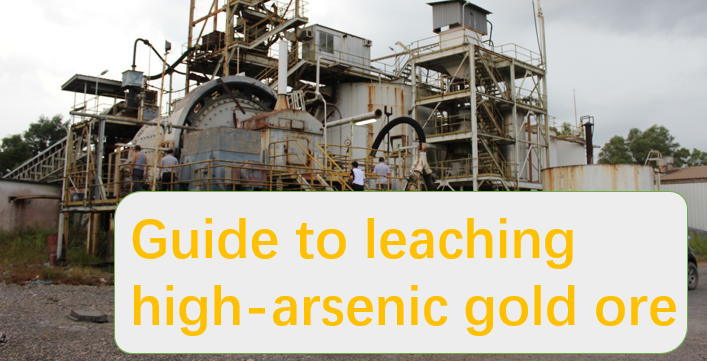Guide to leaching high-arsenic gold ore
2024-11-28 Xinhai (1747)
2024-11-28 Xinhai (1747)
If you have any questions, please contact us through the following ways, we will give you more and better assistance!

Due to the complex composition of high-arsenic gold ore, the gold is generally embedded in pyrite and arsenopyrite in fine, microscopic and submicroscopic particles. Pure arsenic gold ore is rare. Pyrite, pyrrhotite, stibnite and other sulfides (realgar, orpiment, etc.), carbonaceous materials, etc. are often closely associated with gold-containing arsenopyrite.
During the leaching reaction, Au reacts and dissolves with NaCN in the presence of 02. A redox reaction occurs, Au is oxidized to monovalent gold ions, and combines with NaCN to form a complex, and finally separates gold from the mineral. In the actual gold leaching solution, a protective alkali should be added to prevent cyanide from hydrolyzing into hydrocyanic acid, enhance the stability of the solvent, and reduce losses. Therefore, during cyanide leaching, the pH value of the solution is usually alkaline.

Thiourea is a strong ligand that can combine with Au to form a stable complex ion, thereby dissolving gold for leaching. In the process of thiourea dissolving gold, it is converted from a zero-valent state to a +1-valent oxidation state. Therefore, in order to make the reaction proceed smoothly, suitable oxidants are often added, such as oxygen, Fe3+, H2O2, KMnO4, etc. The thiourea method has low toxicity, good selectivity, and rapid gold leaching.
Halide leaching of gold appeared earlier. In addition to halogen fluorine and astatine, chlorination, bromination, and iodination have all been reported. The chlorination method is to use liquid chlorine or chloride salt to leach gold from the ore, and then use Fe2+ to perform a reduction reaction to replace the gold. Because chlorine is highly active, the leaching speed is very fast and the mineral surface will not be passivated. It is suitable for leaching carbonaceous gold, high arsenic sulfur and other gold ores, with a high recovery rate and more environmentally friendly than cyanide.